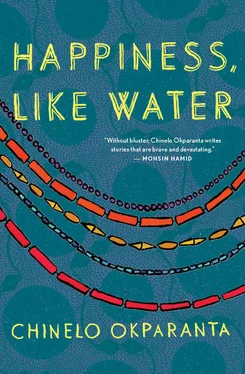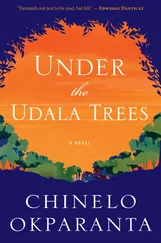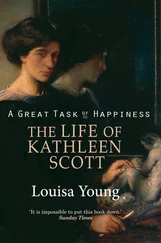He patted me on the back, then opened his door and stepped out. He came around to my side, pulled me out of the car and into the back seat, all the while telling me not to worry, that he would not hurt me. Then all his weight was on me and he was pinning open my thighs with his. He paused only to grab a condom from his pocket, to tear open its plastic wrap, and to slip it onto himself. I screamed, but it was dark all around, empty space like in an open field. Who could have heard?
He dropped me off several blocks away from Njideka’s flat. It was just as well, I thought at first. But as soon as I got out of the car, I decided that I could not bear to see her. It would be like staring my sin straight in the face. It would have been too difficult a thing to do.
And so I walked home, many kilometres on bare feet, holding the sequined heels that Njideka had lent me. I found the stash of bills in my purse as I walked. One thousand dollars. All that money, perhaps because he knew that I had never been with a man. Maybe Njideka had told him. It was more than enough to pay for Mama’s visits to a specialist.
Mama was kneeling by the sofa, her arms and chest resting on its cushion, as if she’d been in the middle of praying. She was wearing her grey wrapper tied around her chest. She turned slowly, her eyes probing. She must have seen the streaks of mascara coming down my face, the blotched lipstick around my mouth, the dried bits of blood that had dripped down my thighs, a darker shade of red than the dress I was wearing. I went to her, kneeled before her. But she only shook her head. ‘Mama, ndo,’ I said. Sorry.
Her eyes appeared sunken, and her shoulders were slumped lower than ever before. She only shook her head, and then she slowly walked away.
Days went by, and then weeks. I did not return to school, instead I remained at home with Mama. Every day I made her pepper soup and brought it to her. But each time I went back for the bowl, the soup was just as I had left it, only cold. She did not speak to me.
Then one Saturday, nearly two months later, I brought her pepper soup again in a tray, and for the first time since my night as a runs girl, she looked at me, her eyes dull. ‘It’s been a long time since we went to church,’ she said. ‘Tomorrow we should go.’
‘Yes, Mama,’ I said, but I wondered how she could possibly make it through the bus ride.
That evening I came back to collect her bowl of soup, and again, it was cold and untouched. She was leaning on the sofa again, as if about to pray.
I left her where she was and went off to wash the plates, to sweep the floors, to bathe. When I returned to her, she was still leaning on the couch. I called out to her. ‘Mama! Do you hear me? Mama!’ She did not respond. And then suddenly I was turning her around, checking for breath. And there was none.
Papa’s brothers and sisters came to the funeral. Some of Mama’s cousins came, too, along with some distant relatives, many of whom I did not recognize. ‘Ekwensu,’ they all called it, when I explained to them how the pain began. The work of the devil.
Together, we buried her in the cemetery not too far from our flat, the same place where we buried Papa. I used the money from my night as a runs girl to pay the funeral expense.
Sometimes I go to the cemetery to visit Mama and Papa. On days when I’m overwhelmed by shame, I go in the evening or at night, as if the darkness will somehow mask the shame. I allow myself to remember the time before Papa died, and if I listen carefully, I sometimes hear Mama’s laughter ringing out, somewhere far away from the cemetery.
And sometimes I think that if I were to be placed in a valley full of bones, I would create a new Eve, create her from a new set of bones. And I would lay sinews upon her dry bones, and flesh upon the sinews. And I would cause there to be a noise, a clicking noise, and everything would fall in place. And I would cause breath to enter in, and this new Eve would live.
And this new Eve would walk amongst the trees of the garden. And she would drink from the waters of the river of the garden. And again, she would eat the forbidden fruit. But she would not be cast away from the garden, because she would be given the opportunity, just once, to ask for forgiveness. And she would be forgiven.
We drive through bushes. We pass the villages that rim our side of the Bonny River. The roads are sandy and brown, with open gutters, and with wrappers and cans and bottles strewn about. Collapsing cement shacks stand alongside the roads, in messy rows, like cartons that have long begun to decompose. There are hardly any trees, and the shrubs are little more than stumps, thin and dusty, not verdant as they used to be.
A short distance from us, something comes out of the river, a small boy or girl, maybe six or seven years old. Hands flail in the air and another child joins — typical children’s play. Except that it’s too early in the morning for that. Except that their skin, and even the cloth around their waist, gleams an almost solid black, that oily blackness of crude.
The bus moves slowly, and for a bit, as we make our way out of Port Harcourt, I worry it’ll break down. The last time I made this trip (about a year ago now), there was a problem with the engine. The bus only made it to the terminal in Warri, not quite halfway between Port Harcourt and Lagos. When we arrived at the terminal, the driver asked us to exit. He locked the door to the bus and went inside one of the offices in the terminal. He locked the office door too, leaving us outside to fend for ourselves. We had passed no inns or motels on the way. Just splatters of small shops, their zinc roofs shining in the sun. Lots of green and yellowing grass. Clusters of trees.
At the terminal, I found a nice patch of ground on which I slept, using my luggage as a pillow under my head. Some passengers did the same. Others, I assume, wandered about the terminal all through the night. The next morning another bus arrived. It took us from Warri to Lagos. I made it just in time for my interview. Lucky that I had left a day in advance. Not that leaving in advance made much difference in the end: as with the two previous interviews, my application was declined.
I sit on the bus again, slightly more hopeful about the engine and much more hopeful about the interview. I have not left a day early, but so long as the bus does not break down, I expect that this interview will be a success. This time I have a plan and, even if I hesitate to be as assured as Gloria is, there is a good chance that she is right, that very soon I will be on my way to her.
It was on a dry and hot day in November that Gloria and I met. The headmistress had arranged it all: I would be Gloria’s escort. I would show her around the campus for the week.
That day, the headmistress stood by her desk, me at her side, waiting for this Gloria Oke. I was already one of the senior teachers at the time; I had been at the school for nearly ten years by then.
I’d expected that she’d come in like the big madam she was, ‘big’ as in well-to-do and well known, maybe with a fancy buba and iro in lace, with a headscarf and maybe even the ipele shawl. Even with the heat, the headmistress, and all the big madams who visited our campus, came dressed that way.
But Gloria entered, tall and lanky, a bit too thin to be identified as a ‘big madam’. She wore a long ivory-coloured gown, no fancy headscarf, no ipele hanging from her shoulder. Her unpermed hair was held together in a bun at the nape of her neck. Pale skin stuck out in contrast to dark brown eyes and hair. Her lips were natural, not lipstick red. On her feet she wore a simple pair of black flats.
Even then, there were things I liked about her: the way her eyes seemed unsure, not being able to hold my gaze. The way she stuttered her name, as if unconvinced of her own existence in the world. And yet her voice was strong and firm, something of a paradox.
Читать дальше












